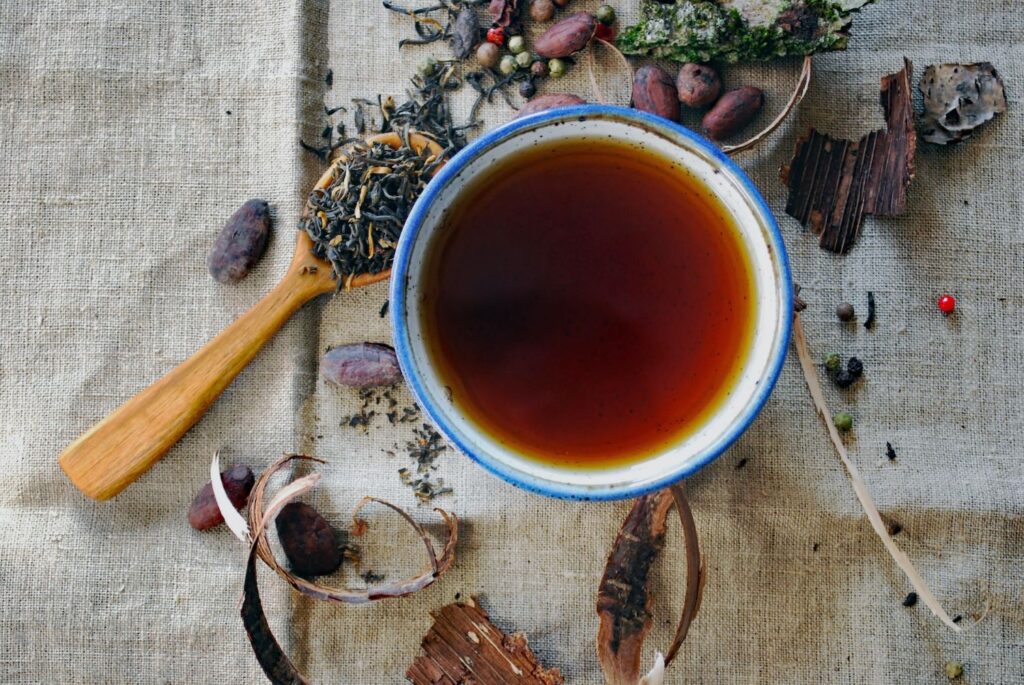Bloating, pain, constipation? If you’re struggling with your digestive health, read on how bitters can help soothe and improve it.
During my recovery from Bulimia Nervosa, my whole digestive system seemed to be rebelling against me. My belly would cramp and bloat after meals and I’d be left with an uncomfortable heaviness for hours. I struggled to identify hunger and satiety signals, felt ‘full’ with even small amounts of food, and always felt like my abdomen had a mind of its’ own.
In my late twenties I developed a sack full of gallstones. The stabbing pain through my chest and shoulder, and the worsening abdominal cramps and nausea became almost constant. I was almost afraid to eat for fear of subjecting myself to more pain.
As I was still navigating an ED recovery during this time, the uncertainty of when I was truly hungry or full, combined with the fear of eating too much and being in terrible pain, was quite distressing.
Even after learning about ‘gallbladder sludge’ and trying some alternative remedies involving caster oil, I ended up having a laparoscopic cholecystectomy (gallbladder removal) to reduce the inflammation and remove the ‘problem’.
I had no idea then that by removing my gallbladder, it would create a whole new set of digestive problems!
Only after surgery did the doctor tell me that I’d have to take digestive enzymes for the rest of my life, so I began educating myself about my own digestive health and how I could support my body and digestion better.
It’s nearly two decades later, and for most of that time I’ve not taken digestive enzymes. After a year or two I gently weaned myself off them and began to change my diet to accommodate my compromised bile production. That doesn’t mean I didn’t have to navigate the ups and downs of digestive upsets!
Removing unhealthy fats was easy but introducing healthy fats on my road to recovery was more of a challenge.
Depending how food was prepared and interacted with my digestive tract, I’d often be left curled up on my side, belching and burping in tremendous pain for up to three hours after meals. I could never quite figure out exactly which food, and what combination, offended by stomach and intestines so much.
The frustration in my worst moments of digestive upset would drive me to tears.
Over the years I’ve continued to openly explore new ways to befriend my body and support healthy digestion. I’ve tried herbal teas, supplements, powders, concoctions, essential oils (particularly peppermint) and potions galore. But what I’ve found to make the most difference is specific bitters, traditionally used in Chinese medicine, Ayurveda, and Indigenous cultures across the world.
Bitters
Modern taste buds are quite familiar with the sweet side of food but have become distanced from the bitter.
We often unknowingly, yet sometimes willingly, consume high amounts of hidden sugars in a vast selection of readymade sweets, coffee syrups, packaged and frozen meals, and commercially produced foodstuff.
Aside from the coffee purists who can’t start the day without their bitter brew, not enough people in the western world are consistently eating enough beneficial bitter foods like broccoli, rocket, cabbage, brussels sprouts, radishes, dandelion greens and kale. All beneficial foods high in cancer-fighting compounds and liver cleansing abilities.
Traditionally used in Chinese medicine, Ayurveda, and Indigenous cultures across the world, bitters are considered by scientists to be one of our basic tastes: sweet, sour, salty and umami being the others. Each taste compliments, enhances and/or balances out the others. A little bitter increases sweetness and reduces the tendency to crave more.
In our modern world of convenience, our food preferences lean more towards the pleasurable side of sugar, fat, and salt and we’ve all but forgotten the many benefits of bitter foods – even the obvious like ginger, citrus and peppermint.

Bitters are comprised of herbs and botanicals traditionally used to aid digestion, increase bile flow and stimulate gastric desire.
They come from any combination of herbs, roots, bark, fruit, seeds, or flowers. Bitter herbs have been used for centuries within indigenous communities and relied upon as nature’s healing medicine in various cultures prior to the emergence of allopathic medicine.
Bitters belong to a chemical group called Iridoids found in a wide variety of botanical plants (and some animals). Iridoid compounds are found to have therapeutic properties to prime and support digestion. As one of the active components used in natural and traditional Chinese medicines, iridoid compounds have shown to possess many biological effects such as liver protection, anti-respiratory and anti-tumour effects. Research has confirmed the historical use of bitters as a safe and effective, natural form of treatment for reducing inflammation in the body (1).
Ethnobotany is a branch of study that focuses specifically on medicinal plants and the traditional uses of them in lost cultures (2). An ‘Ethnobotany studies’ Google search shows a selection of studies in the past 10 years available on the National Centre for Biotechnology Information (NCBI), PubMed, and various research institutes.
Not nearly enough studies have been done to bring the benefits of bitters to the mainstream, however Herbalists keep this wisdom alive, just as the traditional custodians and healers have passed it down through generations. There are plenty of wonderful books on modern herbology with recipes and suggestions for all kinds of ailments.

Bitters and digestion
Due to modern lifestyles, an increasing number of people suffer from digestive complaints with symptoms ranging from acid reflux, indigestion, bloating, nausea, vomiting, belching, burping, flatulence, stomach pain, constipation, and sluggishness.
Some of these symptoms are caused by eating too fast or too much, eating a poor diet, consuming unhealthy fats, and too many simple carbohydrate foods. Other symptoms can be caused by various conditions ranging from inflammation of the gallbladder, food intolerances, gastritis, SIBO (small intestinal bacterial overgrowth), IBS (irritable bowel syndrome) and more commonly, dyspepsia (3).
Digestive bitters have a long history of traditional use in soothing digestive complaints such as excess gas and bloating, nausea and heartburn.
Bitters can strengthen your digestive response by encouraging saliva and enzyme secretions and supporting the liver to gently detox (4). All of this helps to support a more comfortable and efficient transit of food throughout the digestive tract.
Saliva plays essential roles in food perception and digestion, providing breakdown of starch and lubrication in support of chewing and swallowing (5).
Bitters are known to stimulate saliva, increase appetite, and prime the body to metabolize nutrients more efficiently. In turn, this strengthens the digestive tract and decreases discomfort.
One study showed that Iberis amara, caraway oil, peppermint oil, curcuma extract, and ginger extract particularly were found to be superior compared to placebo for effective relief of dyspepsia (6).

Bitters and the nervous system
Our body is designed to eat and digest in a calm, relaxed state.
This state directs precious energy from the Fight/Flight or Freeze states towards the digestive organs to maximise nutrient absorption and waste production.
Bitter taste receptors called “T2Rs” are scattered throughout the body and are involved in the physiology of the respiratory system, gastrointestinal tract and endocrine system (7). Bitters can help the system to move into the parasympathetic state through these T2R receptors and stimulate digestive juices in preparation.
Therefore, taking bitters prior to mealtimes helps to stimulate our relaxation response, and prepare the body for digesting food and maximising nutrient absorption more effectively.
Some bitter herbs are best taken prior to meals to aid digestion, whilst other can alleviate symptoms of bloating, gas and discomfort during and after meals.

Herbs for digestive bitters
Some herbs are best before meals, others are helpful during or after meals. As each have different properties, they interact with an individual’s system differently.
Below is a list of the most common digestive bitters used in tinctures and sprays, although they are not exhaustive by any means:
- Ginger.
- Fennel.
- Peppermint.
- Gentian root.
- Rosemary.
- Chamomile.
- Lemon Balm.
- Turmeric.
- Cloves.
- Cardamom.
- Cinnamon.
- Burdock root.
- Angelica root.
- Dandelion root.
Additional remedies to reduce inflammation in the gastrointestinal tract are Slippery Elm bark and marshmallow root.
I encourage you to investigate reputable herbal educational sources to learn more about what each of these herbs are best for and which ones may be of support for your unique digestive experience.
There are certain herbs that may not play well with medications. Ensure you do your research and stick with the most studied digestive herbs that are recommended as safe for consumption.
Consult your doctor if you are taking any medications.

Making your own digestive bitters
Whilst you can certainly create your own bitters blend using gluten-free alcohol or apple cider vinegar (alcohol-free) and organic dried herbs, it is wise to be aware of the correct ratios and recommended doses.
Certain herbs can be quite potent when used in excess or unbalanced ratios and can cause diarrhea, nausea or a sore stomach (8). Some drugs may not interact well with bitters so be sure to read the labels and always consult your medical healthcare provider first if you are taking medications to be aware of any contraindications prior to use.
Final thoughts
Bitters can greatly improve your digestion, experience and absorption of a meal which may reduce acid reflux, burping, constipation, and flatulence. There’s a lot to like about them and hopefully I’ve intrigued you to try them, or at least to want to learn more.
Just remember – a little bitters go a long way!
Photos:
- Featured photo by Drew Jemmett on Unsplash.
- Photo by Julia Topp on Unsplash.
- Photo by Conscious Design on Unsplash.
- Photo by Nathan Dumlao on Unsplash.
References:
- https://www.ncbi.nlm.nih.gov/pmc/articles/PMC3873812/
- https://pubmed.ncbi.nlm.nih.gov/21554174/
- https://www.ncbi.nlm.nih.gov/pmc/articles/PMC4446506/
- https://www.webmd.com/digestive-disorders/what-to-know-about-digestive-bitters
- https://www.ncbi.nlm.nih.gov/pmc/articles/PMC6825871/
- https://pubmed.ncbi.nlm.nih.gov/11694755/
- https://pubmed.ncbi.nlm.nih.gov/27032752/
- https://theherbalacademy.com/folk-method-herbal-preparations/
Resources:
- DIY Bitters, Reviving the Forgotten Flavour – A Guide to Making Your Own Bitters for Bartenders, Cocktail Enthusiasts, herbalists, and More, by Jovial King & Guido Masé.
- The Complete Medicinal Herbal, by Penelope Ody.
- The Complete Book of Herbs, by Andi Clevely and Katherine Richmond.
Author:
Viki Thondley
Viki Thondley-Moore is an Integrative Holistic Counsellor, Brain-Based Coach, Clinical Hypnotherapist, Mind-Body Somatic Practitioner, Wellness Coach, Meditation Teacher, Educator and Disordered Eating Specialist. Viki is founder of MindBodyFood and Founder/Director of the MindBodyFood Institute.
DOWNLOAD OUR COURSES GUIDE
Learn More About Our Course Offerings and Discover Which New Wellbeing Career Best Suits Your Passion!








